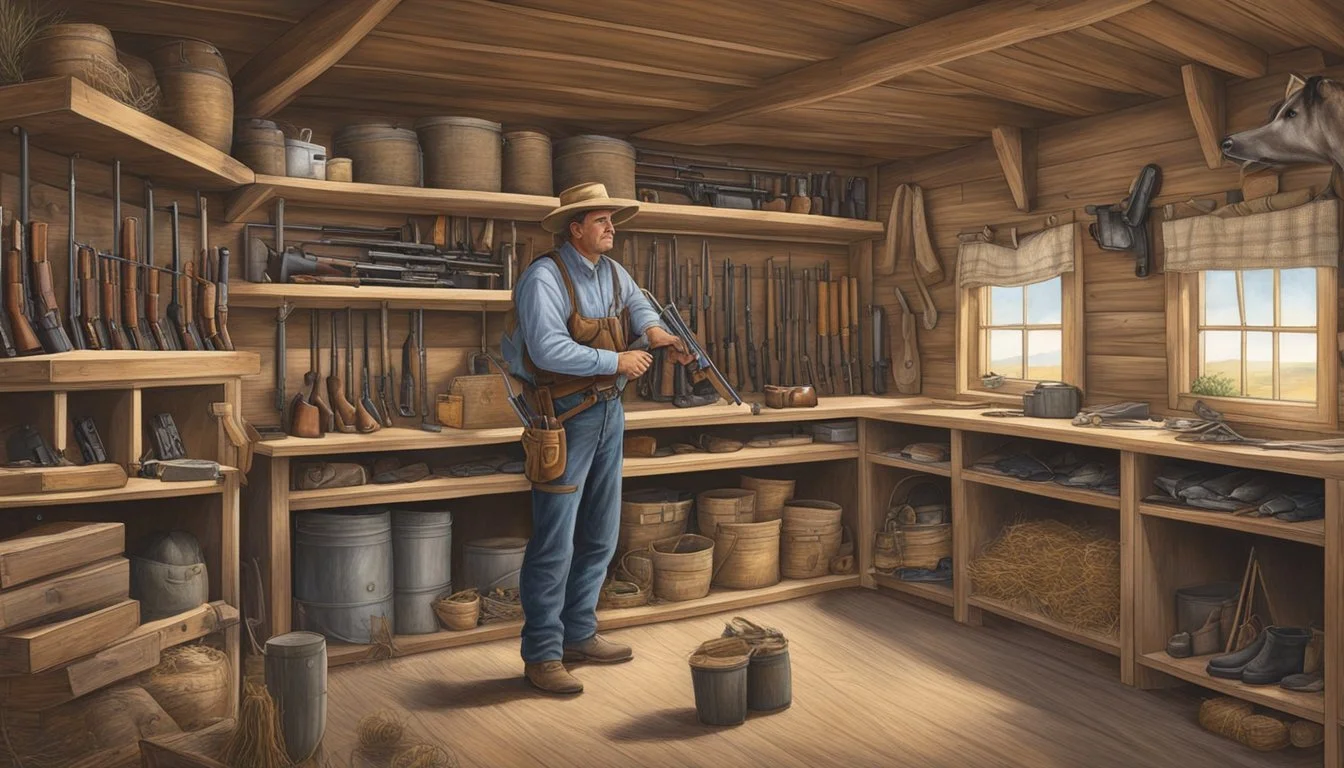Gun Laws in Utah for Homesteaders
Understanding Your Rights and Regulations
Understanding the gun laws in Utah is crucial for homesteaders who wish to ensure their compliance with state regulations while asserting their Second Amendment rights. The Beehive State maintains a set of firearm regulations that are considered permissive relative to many other states, reflecting a strong culture of individual gun ownership. Homesteaders often seek to combine self-reliance with legal awareness to navigate the responsibilities that come with firearm ownership in Utah.
Within the state, no permit is required for the possession of rifles, shotguns, or handguns, although there are stipulations concerning the carrying of loaded firearms in public spaces. For those seeking to carry a concealed firearm, Utah law stipulates that individuals must complete a firearms safety course approved by the Utah Bureau of Criminal Identification. Additionally, open carry is legally recognized for individuals 21 years of age or older who are legally permitted to possess a firearm.
Homesteaders should also be aware of the specifics of Utah's 'stand your ground' laws, which provide legal ground for using a firearm in self-defense. As such, responsible gun ownership includes a thorough understanding of when and how firearms may be lawfully used. Incorporating this knowledge into their homesteading practices ensures they remain within the bounds of the law while upholding their own safety and security.
Understanding Gun Laws in Utah
Utah's gun laws provide a framework for the possession and use of firearms within the state, which includes specific requirements for permits, ownership, and compliance with background checks. Homesteaders and residents alike need to be well-informed to responsibly exercise their right to bear arms.
Historical Background
In Utah, the right to keep and bear arms is enshrined in the state constitution and reflects the longstanding tradition of gun ownership. Understanding this historical context is critical as it shapes the modern legislative landscape of firearm regulation in Utah.
State Permit Requirements
Concealed Firearm Permits (CFP): Residents must apply through the Bureau of Criminal Identification (BCI), fulfilling requirements that include:
A firearms safety course approved by the BCI.
Proper identification and a clean criminal record.
Permitless Carry: Utah permits residents who are legally able to possess a firearm to carry a concealed weapon without a permit within the state.
Possession and Ownership
Utah law stipulates the following about firearm possession and ownership:
Age: Individuals must be at least 18 to purchase a handgun from a private individual and 21 from a licensed dealer.
Prohibited Persons: Includes those convicted of a felony, individuals adjudicated delinquent for an offense that would be a violent felony if committed by an adult, those dishonorably discharged from the armed forces, unlawful users of controlled substances, among others.
Preemption: The state has authority over local jurisdictions regarding firearm laws to ensure consistency statewide.
Background Checks and Compliance
Background checks are required for all firearms purchased through licensed dealers, aligning with the following:
The process is conducted through the National Instant Criminal Background Check System (NICS).
Private sales between residents are not mandated to have background checks, but both parties must ensure they're not transferring a firearm to prohibited persons.
Compliance with these laws is crucial for the public safety and legal exercise of gun ownership rights in Utah.
Firearm Carrying Regulations
In Utah, the carrying of firearms by residents is governed by identifiable regulations pertaining to concealed and open carry. These laws delineate the criteria for legally carrying handguns and other firearms in public spaces, impacting both concealed carry permit holders and those engaging in open carry practices.
Concealed Carry
A Concealed Firearm Permit (CFP) issued by the Bureau of Criminal Identification (BCI) is required for residents to carry a concealed handgun. To obtain a CFP, applicants must:
Be at least 21 years of age.
Complete a firearms familiarity course certified by BCI.
Pass a background check including criminal history and submit fingerprints.
Provide a photographic ID.
Reciprocity is granted to non-residents; however, their permit must be recognized by the state of Utah. A comprehensive list of states with which Utah has concealed carry reciprocity can be obtained from the BCI.
Open Carry Laws
Utah permits the open carry of firearms without a permit if the individual is at least 21 years old and meets legal requirements to possess a firearm. It's important to note that:
The firearm must be two actions from being fired or not have a round in the chamber to be carried without a permit.
Carrying a loaded firearm in public is legal with a CFP.
Display of a firearm in public must also consider local ordinances and laws related to public safety and the right to keep and bear arms.
Purchasing Firearms
In Utah, the process of purchasing firearms, like handguns, involves understanding the distinctions between private sales and purchases made through dealers, as well as the state's specific requirements concerning waiting periods and gun registration.
Private Sales and Dealers
When a resident of Utah desires to purchase a handgun, they must be at least 21 years of age. Through private sales, transactions between individuals do not require a background check, whereas purchases from a Federal Firearms License (FFL) dealer necessitate a background check. This check encompasses both state and federal records to ensure the buyer is legally allowed to own a firearm. It is important to note that private sellers are not permitted to sell to individuals they believe may be prohibited from firearm ownership.
Waiting Periods and Gun Registration
There is no mandatory waiting period in Utah after the purchase of a firearm before the buyer can take possession. Also, Utah does not require firearms to be registered with the state. The emphasis is on the instant background check at the point of sale, provided the transaction is being completed through an FFL dealer. This immediate process enables qualified individuals to complete their purchase without an imposed delay.
Utah's gun laws offer a straightforward path for eligible individuals to purchase firearms, keeping in mind the distinction between private sales and dealer transactions and the absence of waiting periods and gun registration mandates.
Ownership Restrictions and Prohibitions
In Utah, the legal framework surrounding gun ownership is designed to prevent certain individuals from acquiring firearms and regulates the use of firearms in specific locations and during certain activities.
Prohibited Persons
Utah law specifies that certain individuals are categorically prohibited from possessing firearms. These include:
Individuals convicted of a felony.
Persons adjudicated as delinquent for an offense that would be a violent felony if committed by an adult.
Individuals deemed mentally defective by a court or administratively, such as found incompetent to stand trial, or found not guilty by reason of insanity.
Those who are unlawful users of or addicted to any controlled substance.
Aliens who are illegally or unlawfully in the United States.
Anyone convicted of a misdemeanor crime of domestic violence.
Persons dishonorably discharged from the Armed Forces.
Individuals who have renounced their U.S. citizenship.
Anyone subject to a court order that restrains the person from harassing, stalking, or threatening an intimate partner or child of such intimate partner.
Individuals convicted of any offense involving moral turpitude.
Regulated Locations and Activities
Certain locations and activities in Utah have specific regulations regarding the possession and use of firearms:
Airports: It is prohibited to carry firearms in secure areas of an airport.
Carrying a loaded firearm on any public street or in any public area is illegal without a permit.
There are restrictions on carrying firearms in courthouses and places where court sessions are held.
Real property: Private property owners have the right to forbid firearms on their premises.
When dealing with firearms on private or public property, it's crucial for individuals to be aware of whether the firearm is unloaded and securely encased or whether they have the explicit consent of the owner or person legally in charge.
Use of Deadly Force in Utah
In Utah, the legal framework supports an individual's right to use deadly force under specific conditions. Understanding when and how this force can be applied is essential for the safety and legality of action taken by residents, especially homesteaders, who may find themselves in remote and vulnerable settings.
Self-Defense and Stand Your Ground
Utah embraces the Stand Your Ground law, a statute that allows individuals to use deadly force in self-defense without the obligation to retreat. This applies even in public spaces. Below are the specific conditions when deadly force is considered justified in self-defense:
The individual reasonably believes deadly force is necessary.
The purpose is to prevent death or serious bodily injury, to themselves or others.
The action is to thwart a forcible felony, such as burglary or aggravated assault.
Protecting Habitation and Real Property
Utah's laws extend the right to use deadly force under the Castle Doctrine, allowing individuals to defend their habitation and real property. The key points include:
Deadly force may be used if one reasonably believes it is necessary to prevent or terminate an individual's unlawful entry or attack upon a habitation.
The law does not require individuals to retreat from their property.
The use of force for property protection must be a response to what reasonably appears to be an attempt at a forcible felony.
Habitation is defined under Utah law as a dwelling place, and this protection extends to any associated buildings within the curtilage of the homestead. Homesteaders, particularly, must be discerning in the application of these protections to avoid legal consequences from misuse of deadly force.
Utah’s Reciprocity and Recognition
Utah is recognized for its strong support of Second Amendment rights, particularly through its comprehensive reciprocity agreements. Holders of Utah's Concealed Firearm Permit (CFP) benefit from laws that allow for the carrying of concealed weapons in various states due to these agreements.
Reciprocity refers to the mutual recognition of concealed carry permits between states. Utah has reciprocal agreements with several states, meaning that Utah's CFP is honored elsewhere, and vice versa. For travelers, it's critical to understand the limitations and requirements of the reciprocal states.
Utah's CFP Recognition:
Alaska: Acknowledges Utah's CFP, allowing lawful carry by permit holders.
Hawaii: Does not have a reciprocity agreement with Utah.
Idaho: Honors Utah's CFP for concealed carry.
Residents and non-residents carrying pursuant to a CFP must be at least 21 years old. However, Utah also offers a Provisional Permit for individuals aged 18 to 20. It's crucial to note that the recognition of the Provisional Permit may vary among states.
State Recognizes Utah CFP Notes Alaska Yes Non-residents should comply with Alaska’s state laws while carrying. Hawaii No Idaho Yes Recognition extends to both resident and non-resident Utah permit holders.
Carriers must be aware that while a Utah permit grants privileges, it does not exempt them from adhering to the specific firearm laws that apply in each jurisdiction. It is the carrier's responsibility to be familiar with and to respect the laws of the states they are visiting.
Legal Responsibilities of Gun Owners
In Utah, gun owners have specific legal responsibilities, particularly in the areas of transportation and storage of firearms as well as reporting and loss prevention. These practices are critically important for ensuring public safety and minimizing the risk of gun violence.
Transportation and Storage of Firearms
Utah allows for firearms to be transported in a vehicle, provided they adhere to state regulations. Firearms may be transported either loaded or unloaded, but there are nuances to consider for responsible handling:
Loaded Firearms: Gun owners must possess a valid permit to carry a loaded firearm in public spaces, including streets or in a vehicle.
Unloaded Firearms: No permit is required to transport an unloaded firearm in a vehicle, but it is recommended that the owner ensures the firearm is not easily accessible, for safety reasons.
The storage of firearms is equally important to ensure they do not pose a hazard:
It is recommended that firearms be stored in a secure, locked space.
Gun owners should use gun locks and safes to prevent unauthorized access, particularly by children or individuals prohibited from firearm possession.
Reporting and Loss Prevention
Responsibility extends to the prompt reporting of lost or stolen firearms, a measure crucial for loss prevention and public safety:
Reporting Requirement: Gun owners are expected to report lost or stolen firearms to local law enforcement authorities promptly.
Loss Prevention: Owners are encouraged to maintain records of their firearms' make, model, and serial number to aid recovery efforts.
The emphasis on these responsibilities supports a culture of careful and accountable gun ownership essential for maintaining public safety.
Implications of Federal Laws in Utah
Federal laws set a baseline for gun ownership, which Utah must follow. The Second Amendment guarantees the right to bear arms, but federal statutes also impose restrictions to enhance public safety.
Individuals with felonies or crimes of violence on their record are prohibited from owning firearms. The law is explicit: those convicted of a felony cannot legally possess a gun. Furthermore, an offense involving domestic violence, regardless of a misdemeanor or felony, also disqualifies an individual from gun ownership, which aligns with the federal goal of protecting victims of domestic abuse.
The use of alcohol and firearms is another area under scrutiny. Federal guidelines dictate that individuals who are unlawful users of or addicted to any controlled substance are prohibited from owning firearms. This extends to those with a history of alcohol abuse, as irresponsible use of alcohol could lead to dangerous situations.
Petitioning for a review of a prohibited status is an option for some individuals. Those who believe they have been wrongfully barred from owning a firearm due to a mental health adjudication or commitment can seek recourse. A petition for review process is available, but the path to reinstatement of gun rights is both rigorous and meticulous.
In summary, while Utah has its own set of gun laws, residents must also observe federal regulations which are designed to prevent individuals who may pose a risk from accessing firearms, balancing the right to bear arms with concerns for public safety.
Additional Considerations for Homesteaders
When homesteaders in Utah consider the role of firearms on their property, it's important to understand the specific legal context and practical needs related to rural living and self-sufficiency.
Firearms in Rural Areas
In rural Utah, firearms are often deemed essential for protection and hunting. Homesteaders should note that while Utah law permits individuals 21 years of age and older to purchase handguns from a Federal Firearms License (FFL) dealer, those under 21 are prohibited from making such purchases. For those living on a homestead, a firearm can be a critical tool for defending livestock against predators and for responsibly managing wildlife populations through hunting. It's important for rural inhabitants to complete a firearms safety course approved by Utah's Bureau of Criminal Identification to ensure they can safely exercise their rights.
Homesteading and Self-Sufficiency
The desire for self-sufficiency on a homestead extends to the responsible use of firearms. Property owners in Utah can take advantage of the state’s homestead laws which provide an exemption up to $20,000 of the property's value if it is the primary residence. This protection can provide peace of mind for homesteaders investing in their property and tools, including firearms for self-defense and hunting. Given the state's support for the Second Amendment, Utah homesteaders must nonetheless adhere to all regulations when acquiring and using firearms to maintain a safe and lawful homestead environment.
Conclusion
Utah's gun laws cater to a balance between the rights of individuals to bear arms and the collective need for safety and order. Homesteaders in particular should be aware of the crucial requirements in order to comply with state regulations.
Firearms Safety Course: A mandatory step for obtaining a permit, ensuring that gun owners understand safety and legal responsibilities.
No Permit for Possession: One can own a rifle, shotgun, or handgun without a permit, but carrying a loaded firearm in public spaces requires a permit.
Open Carry Guidelines: Adults 21 or over can openly carry a firearm without a permit if it is two actions away from being fired. Individuals between 18 to 21 must have a permit to carry a loaded firearm.
Minors' access to firearms necessitates adult supervision or consent, stressing the importance of responsible guardianship in preventing unauthorized use.
The law carefully defines prohibited persons, reflecting an effort to prevent firearm access to individuals who might pose a risk to public safety. Homesteaders must also note the significance of private transactions and understand that private sellers must conduct background checks through licensed dealers.
Finally, one must not overlook the dynamic nature of laws, which are subject to legislative changes and judicial interpretations. It's imperative for firearm owners in Utah to stay informed and ensure they remain within the bounds of the law.








